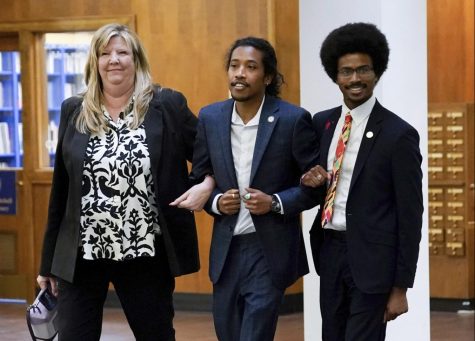WHO declares coronavirus a global health emergency
In this Thursday, Jan. 23, 2020, photo, a staff member wearing a hazardous materials suit hauls a bin at a hospital that reported a coronavirus death in Yichang in central China’s Hubei Province. China is swiftly building a 1,000-bed hospital dedicated to patients infected with a new virus that has killed 26 people, sickened hundreds and prompted unprecedented lockdowns of cities during the country’s most important holiday.
On Friday, the World Health Organization declared the coronavirus a global health emergency, signaling the severity of the virus while the State Department released a statement saying all Americans should cease travel to China.
The WHO declaration comes a week after the organization initially declined to deem it a global health emergency. The change is mostly due to fears that the virus could spread to countries with weaker public health systems.
Dr. Alfredo Mena Lora, an infectious disease specialist at St. Anthony hospital and the University of Chicago hospital, said the declaration allows the organization to provide financial aid to countries affected by the emergency.
“The WHO wants to protect all of its member countries and the world by mobilizing response funds and other things to help cope with the emergency,” Mena Lora said.
The primary source of the virus has seen major growth in China. The Centers for Disease Control and Prevention believe that the source of the virus is linked to seafood and animal markets.
There are now over 14,557 total cases worldwide. As of Sunday evening, there have been 304 deaths – with one outside of China in the Philippines.
In an attempt to curb the spread, several major airlines across three continents – including American Airlines, British Airways, Delta, Lufthansa and United – have suspended all flights to and from China. Prior to this, the U.S. and other nations were attempting to evacuate citizens remaining in Wuhan – but over 1,000 Americans remain in the city as the quarantine persists.
Coronavirus is a general term for a set of viruses that are often seen in camels, cattle, cats and bats, according to the CDC.
“This virus is a regular flu type virus that cause upper respiratory infections, and sometimes lower respiratory infections,” Mena Lora said. “What is new about this virus is that it came from a mutation of samples that came from a fish market. A lot of these new viruses or conditions mutate from an animal reservoir. For example there is a lot of influenza in birds and other mammals, so it just takes one or two mutations for those diseases that affect animals to affect us.”
“The problem is that when that happens our immune system does not know this new virus, so it tends to cause more harm initially and then hopefully our immune system gets better at it,” he said.
The main issue so far with this strain of the coronavirus has been its ability to spread quickly while it is hard to predict its lethality this early in the outbreak.
“When you look at the spread, it’s alarming,” said Lourdes Molina, an assistant teaching professor at DePaul and an expert in epidemiology. “When you compare to the [severe acute respiratory syndrome] outbreak, it appears that the coronavirus that we are looking at now is spreading quicker than SARS.”
Mena Lora also spoke on the mortality of the coronavirus.
“So far the numbers that we have are the tip of the iceberg, they are probably slightly muted,” Mena Lora said.
“The mortality rate is not terrible. By that I mean there have been 80 deaths [at this time], that’s bad, but there has been at least a thousand cases and probably thousands.”
Mena Lora also noted that the virus may be more dangerous for older individuals or very young people, which is similar to the flu. Mena Lora added there are ways the government can impose to attempt to halt the spread.
“If we use good old fashioned public health measures – identifying cases, secluding or isolating cases while we are trying to test and diagnose and getting the word out – that appears to be helping us to some extent when containing this outbreak,” she said.
Mena Lora and Molina both said caution and preparedness are key to preventing further spread of the virus, which will be brought to the forefront as the first case of human to human infection was reported in Chicago Wednesday night.
“While the first case of person-to-person transmission here in the United States is alarming, there is still relatively low threat to the American population,” Molina said . “Authorities are still trying to fully understand how the disease is transmitted. We should all continue to be vigilant in hand washing and covering our mouths when coughing/sneezing and when we’re around people who are coughing and sneezing.”
Mena Lora had a similar thought process on the first human-to-human infection.
“I am not surprised that a close contact to the patient acquired the virus,” he said. “I do not think this changes anything, at least to me, on how I think about this condition. These are folks that live in the same house, sleep on the same bed I am sure. That is somewhat expected.”
“From a preparedness standpoint Chicago is as prepared as it can be, in the sense that hospitals throughout the country and throughout Chicagoland know what the person under investigation is…and the Department of Public Health helps us triage and helps us test these folks,” he said.
DePaul students have also felt the shockwaves of the virus, especially international students.
Yiran Wang, a DePaul student from Qingdao, China discussed the way her family has had to adapt.
“Now my sister has to work from home,” she said. “The government recommended that no one on my hometown should go out till Feb. 9.”
Wang also said that people in Chicago are overreacting a bit to the cases in the city. Along with this, Mena Lora also spoke of the tendency for people to panic in this type of situation.
“Panic is never justifiable, but it is always understandable,” Mena Lora said. “We as humans panic, and there is a lot of herd mentality. This in and of itself is a routine part of any outbreak or epidemic.”
“In the medical community we know that (panic) comes with the territory. Scientists in general have to, A, answer the questions through research and through understanding, and B, try to be as transparent as they can.”
Scapegoating can also be an issue when events that create as much fear as the coronavirus happen. Mena Lora brought up the amount of scapegoating and negative backlash that occurred in the 1980s and 1990s in response to HIV.
“As a society it is our job, and our role, to be prudent and to educate ourselves about what is truly at fault or at risk and work together rather than separate walls,” he said.












